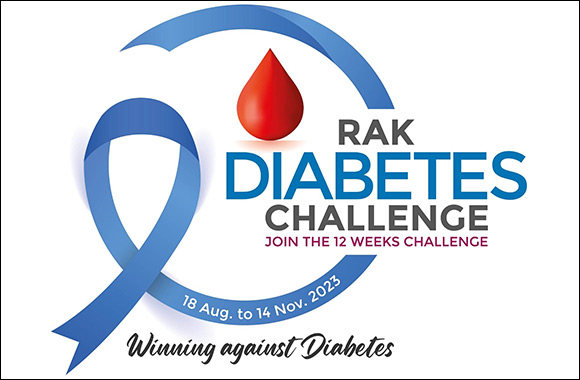The Diabetes Diet is the Best Eating Plan for everyone; offers an array of health benefits including lowered risk of cardiovascular diseases and specific types of cancer
Carbohydrate counting and the Plate Method are recommended for effective meal planning and maintaining a balanced diet.
Shedding just 7-10% of your current weight can yield notable improvements in blood glucose control
19 September 2023; Ras Al Khaimah, UAE - In a recent DiaBeat webinar conducted by RAK Hospital, Ms. Ruba Elhourani, Senior Dietician, and Head of the Nutritional Department, took centre stage to educate participants about the pivotal role of diet in diabetes management. These enlightening sessions conducted every week by the hospital are a key component of the healthcare institution's comprehensive three-month Diabetes Challenge campaign.
Whether grappling with type 1 or type 2 diabetes, the webinar emphasized the critical importance of making informed dietary choices to maintain optimal blood sugar levels. It underscored the need to embrace a well-balanced and health-conscious eating plan, the cornerstone of effectively controlling blood glucose levels and averting diabetes-related complications.
Speaking on the topic of suitable foods for individuals with diabetes, Ms. Elhourani stated, 'A healthy diabetes eating plan is a treasure trove of natural nutrients, low in fat and calories, and bursting with a variety of wholesome foods from all food groups. The linchpin of a diabetes diet comprises fruits, vegetables, and whole grains.'
The webinar advocated for the inclusion of whole grains like whole wheat, brown rice, barley, quinoa, and oats, alongside protein sources such as lean meats, poultry, fish, eggs, nuts, legumes, and tofu.
Furthermore, it emphasized the significance of nonfat or low-fat dairy products, like milk, yoghurt, and cheese, as integral components of a balanced diet. Remarkably, this diabetes-focused diet is beneficial not only for diabetes management but for overall well-being.
Beyond its role in diabetes management, a diabetes-friendly diet boasts an array of additional health benefits, including a lowered risk of cardiovascular diseases and specific types of cancer. It also contributes to maintaining bone health and combating obesity.
The DiaBeat webinar delved into the nitty-gritty of carbohydrate management, a vital aspect of diabetes nutrition. Attendees were educated on recognizing carbohydrate sources and quantifying carbohydrate intake for meals and snacks. The session highlighted the importance of pairing carbohydrates with foods rich in protein, fiber, or healthy fats to regulate post-meal blood sugar spikes.
Moreover, the webinar shared practical strategies for dining out and controlling portion sizes, ensuring that individuals with diabetes can confidently adhere to their dietary plans in various settings. Two invaluable tools, carbohydrate counting and the plate method, were introduced to help attendees effectively plan their meals and maintain a balanced diet.
In the Diabetic Plate Method, you fill half your plate with non-starchy vegetables, one-quarter of the plate of protein foods, and the last quarter of the plate with carbohydrate foods. Top it off with a glass of water or another zero-calorie drink and you've got yourself a well-balanced plate.
Making simple yet effective changes can significantly impact glucose levels and the overall health of individuals with diabetes. Shedding just 7-10% of your current weight can yield notable improvements in blood glucose control. Embracing a diet that's low in fat and rich in fiber proves to be beneficial, promoting satiety and slowing carbohydrate digestion. Aim for high-fiber intake, ranging from 25 to 35 grams per day, to maximize cardiac benefits.
Sources of fiber are abundant in whole grains, beans, nuts, seeds, fruits, and vegetables. Exercise should be a regular part of your routine, with a target of 5-7 days a week and a goal of 150 minutes per week or achieving 10,000 steps daily. Furthermore, for better heart health, it's crucial to monitor fat intake, aiming for a total fat intake of less than 30% of daily calories, with saturated fat at less than 10%, and trans fat at 0%. Reducing added fats, which pack 100 calories per tablespoon, and opting for unsaturated fats found in oils, nuts, and margarine can go a long way in managing diabetes effectively.
For individuals managing Type 1 Diabetes, the webinar elucidated the significance of daily insulin use, harmonizing meal plans with insulin treatment, and incorporating carbohydrate counting into intensive insulin therapy. Strategies for adjusting food intake based on activity levels and minimizing the risk of hypoglycemia were also highlighted.
The DiaBeat webinar bestowed upon participants a comprehensive understanding of which foods to consume in moderation or restrict to maintain optimal blood sugar control. It identified sugary foods, sugary beverages, refined carbohydrates, and high-carb items like white rice and white bread as potential challenges in diabetes management.
For more information on the RAK Diabetes Challenge 2023 and to know the schedule of the upcoming webinars, please visit, https://www.rakdiabeteschallenge.com/













